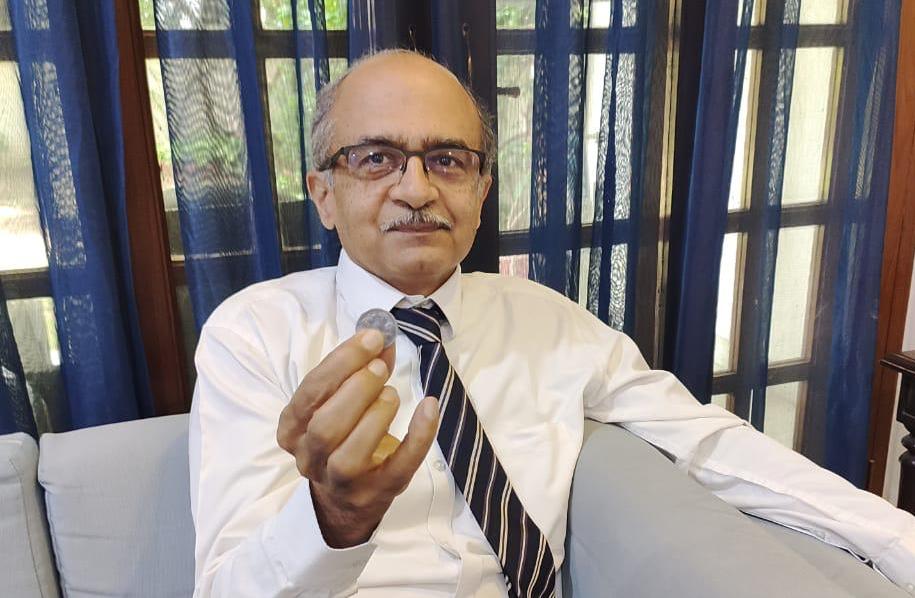The Bhushan saga may seem to be over but the heat generated will keep the judicial pot boiling for some more time. Everyone must be sensing the unease that this ‘harmless’ conclusion has created. The long build-up of weeks, for and against, in what had initially seemed to be a tug-of-war between the Judiciary and an individual social activist-lawyer at the Supreme Court spun out as a much bigger headache. Prashant Bhushan has gracefully accepted the apex court’s order that he pay a token fine of Re 1 as punishment for the charge that he repeatedly committed contempt of court. Bhushan accepted one rupee from his lawyer friend and obliged the court. In sum, it is Bhushan who won and the top court had to put its aggressive attitude to a whimpering end. On the positive side, it ignited a very healthy debate on the state of the judiciary in current times.
A token fine of one rupee was the bare minimum that the apex court could have awarded as punishment. While it makes some sense as a face-saving gesture yet it also made no sense at all. This would be viewed as a careful escape act by the apex court from a sticky situation that it was forced into simply for the bravado of a single judge. Bhushan consistently resisted insinuations from the top court that he erred in criticizing the judiciary and some senior judges of the past who, seemingly, had crossed limits and got the stigma of corruption on themselves. He also ‘teased’ Chief Justice of India, Sharad Arvind Bobde, for sitting and posing for pictures from a luxurious Harley Davidson two-wheeler at Raj Bhavan in Nagpur. The CJI was photographed without a helmet and without face mask in these Covid times, a time when the judiciary is itself in a state of near-full paralysis due to the pandemic and Courts are not functioning.
Every democracy, including India, is expected to be a land where everyone has the freedom to criticise everyone. The judiciary, dependent on tax money collected from the citizens had somehow, through a long-established practice built on the British Raj rules and regulations, tried to always keep itself protected from any accusations of misdeed. Those in the judiciary zealously try to retain much of the practices of the Raj which had built such an edifice to help it lord over the subjects of a colonized race. This zealousness was sadly found missing – in several cited cases in recent times – where the actions and conduct of the black-coated justice dispensers were viewed with great suspicion. The long two-month summer vacation, a privilege only of the judiciary across various wings of the establishment, is well-retained even as there is a huge pile-up of cases running into multiple crores of files. No government has shown the courage to change such luxurious systems in the past over 70 years. Judicial reforms are the urgent call of the times as three-quarters of a century is about to be over since India started its self-rule journey in 1947.
A national judicial service is well-advised, but a question remained as to who is serious about changing things for the better. One of the first statements that Justice Bobde made after he became CJI was a call for a national judicial service so as to induct young and intelligent men and women to improve the quality of judges in future. Today, there are many question marks about this quality. Favours are allegedly the main factor at work in judicial appointments, and the collegium system itself is seen as no better than a scenario of the government itself deciding on judicial appointments. National attention, however, fails to focus on such urgent matters and successive governments, in their five-year fixed terms, do not demonstrate a long-term vision to set things right.
There was massive support for Bhushan when he challenged the judiciary repeatedly. A large part of this support was simply because general people have a feeling that most judges and other judicial officers do not play the game by the rules. That perception is the biggest possible damage that could happen to the judicial system. There is a great need to reboot confidence in this setup. Only those involved in the justice system, the Judges and the judicial officers, can make efforts to change themselves by not only being clean but also seem to be clean. Otherwise, the future seems dark.
